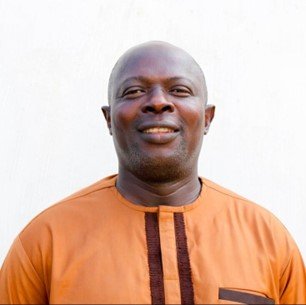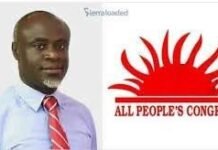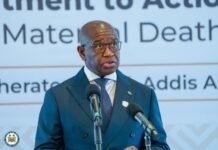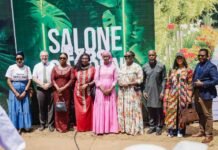By Millicent Senava Mannah
The Sierra Leone Urban Research Centre, with support from GCRF, and in partnership with Liverpool School of Tropical Medicine, Brighton University of Success, CODOHSAPA, COMAHS, and FEDURP have organized a Synthesis Workshop meeting on their Accountability and Responsiveness in Informal Settlements for Equity (ARISE ) Project, which was held on the 15th November, 2023 at the YMCA Conference Room.
The workshop was geared towards charting major activities, events and achievements they have made over the past years. It must be noted that the ARISE Project is to span five years Project and started in 2019 after which they have been working in three Communities in Freetown, Dwarzack, Moiba and Cockle Bay.
Dr. Joseph McCarthy, Executive Director of SLURC intimated that where people live have a lot of influence or effects on their health situation adding that they have been implementing the project in those Communities because residents suffer a lot in terms of health, without sufficient data to be able to show for it which is why they try to influence policies and programs that deal with health situations.
He continued that a research they undertook is not only focusing on health but also wellbeing and accountability systems.
“It is also about how the health system and infrastructure in the country interface with community structures and how that particular connection help prevent how health care is delivered and how residents benefit from health services,” he pointed out.
The Director added that they discovered lots of issues during their research maintaining that the purpose of the meeting is for them to know how they will be able to interpret the research and know from their findings, the key learnings and issues that have been emerging, and the issues that it is already addressing.
According to him, they are also there to not only know what the key issues are that the research will be able to create but to better influence and inform decisions in order to improve health services as well as the governance and activity situations.
“If we must develop as a country, no one side must be left behind. We must talk about influence. When we look at Freetown, we will see that the hills are a disadvantage to the people residing there; so many places have been left out because of how they are connected, including facilities and infrastructure. And we don’t want people to be left out because they are living in informal settlements,” Dr. McCarthy stated.
Rachel Thomas of the Liverpool School of Tropical Medicine, one of the co-leads of the ARISE project, explained that the Project is a partnership between people living in urban informal settlements, researchers and other stakeholders.
She maintained that, they are focusing mainly in four countries Sierra Leone, India, Bangladesh and Kenya working on health and wellbeing in urban informal settlements.
“Together we are collecting data, analyzing data to understand the challenges in terms of health and wellbeing and in terms of Accountability of Governance and other Stakeholders in order to help improve our wellbeing,” Rachel Thomas intimated.
She continued that together they are prioritizing challenges and developing some solutions from ways that Communities and other stakeholders can work together and to improve accountability.
Rachel revealed that they had numerous challenges in implementing the project, and how one is the COVID-19 saying that the time it struck they had just collected their first sample of data and how they had to suspend research activities to focus on relief activities.
“We did a number of activities supporting communities, preventing transmission, and also providing livelihood support. Another challenge we experienced was that the UK Aid dropped in financing the project, so we had to stop the research and focused on solidarity with the communities and progressing some activities of the communities,” she disclosed.
Rachel pointed out that one of their successes is the partnership with the Co-researchers in each of the communities adding how they partnered with the DICOVERC and NACOVERC to ensure that messaging and their activities like vaccination were accepted and well enhanced in the communities.
According to her, another important success was the Power of Light Project with UK artists and local artists in the Dwarzack community trying to develop light sculptures that represented challenges they face in the communities and also holding a light sculpture parade to communicate those challenges.
She also informed how they raised funds to provide public lights for school children to study and for the safety of everyone especially women.
Hindolo Momoh, Spokesperson Western Rural Area, DICOVERC, said partnering with the ARISE Project was beneficial revealing how many people refused to take the COVID-19 vaccine but with the intervention of ARISE many became willing to take the vaccine, and the project also assisted community residents a lot.
The Chief of Dwarzack, Samuel J. S Pessima, commended them for bringing the ARISE Project in their community saying it has helped them a lot in terms of their health and wellbeing and commended them for their huge support to the people in his community during the pandemic.
Jamestina Bayoh, one of the Co-researchers in Moiba Community intimated that their community has benefited a lot from the aforementioned project and how the impact has been great because no one is left out.
Group sessions and presentations climaxed the workshop.




